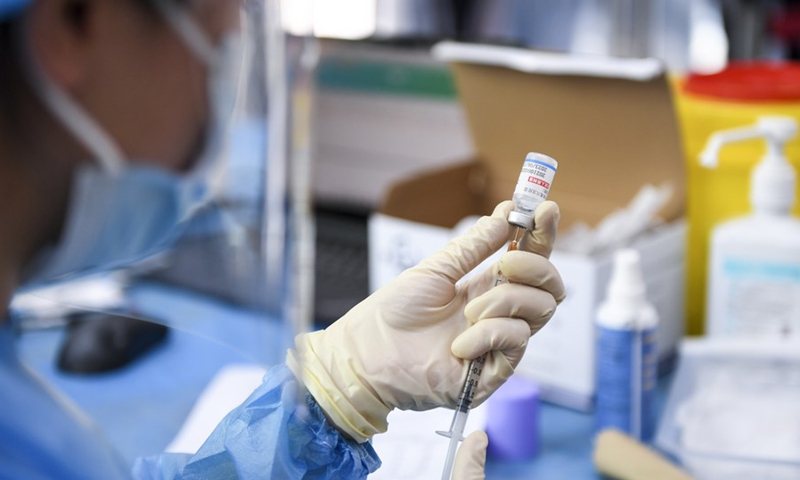
A medical worker prepares a dose of COVID-19 vaccine at a high school in Shenzhen, south China's Guangdong Province, July 29, 2021. Photo:Xinhua
A large number of Russian officials and experts have strongly opposed politicizing the COVID-19 origin tracing, highlighting the devastating effects the move could have on the global fight against the pandemic.
At the Informal Economic Leaders' Retreat of the Asia-Pacific Economic Cooperation earlier in July, Russian President Vladimir Putin urged the international community to join forces in the fight against COVID-19 to speed up global vaccination efforts and revive the economy.
In earlier statements, the Russian leader emphasized that Moscow will never attempt to politicize international cooperation on fighting COVID-19.
At a press conference following the meeting of the BRICS Ministers of Foreign Affairs held in June, Russian Foreign Minister Sergei Lavrov said that politicians "shouldn't strive to score points and increase their popularity by speculating about the COVID-19 situation."
Prominent Russian virologists and researchers agree with this stance and have pointed out the natural origin of the virus.
"All studies show that the virus mutates naturally. All the changes within it are natural, at least they completely fit into the mutation scheme that is known in virology," said Larisa Popovich, director of the Institute for Health Economics at Russia's National Research University Higher School of Economics.
Some new research that proves otherwise may not be devoid of political overtones, she added.
Russian virologist and expert at the World Health Organization (WHO) Dmitry Lvov said the main discussions about COVID-19 origins are not conducted by specialists and professionals in the field but political scientists that try to pursue their own interests.
"It is difficult for me to comprehend the actions and statements that come from the WHO. Different kinds of people work there, and they are under great pressure, including from the United States," he said.
Other experts and officials said Western disinformation campaigns that promote the Wuhan lab leak theory not only hinder global anti-virus efforts, but are intended to deflect attention from other theories.
International affairs columnist Mikhail Morozov said it was striking that "studies proving the man-made nature of the new coronavirus began to appear as if on command," adding that evidence of the Wuhan lab leak theory was groundless, contradictory, and lacks reliable sources.
"All this suggests that the West tries to use every possibility to accuse China of spreading the infection, or at least they are using the global tragedy for their own political goals or to divert attention from other theories," Morozov said.
RIA Novosti columnist Victoria Nikiforova wrote that following the sudden closure of the U.S. military biological laboratory at Fort Detrick in 2019, a strange lung disease epidemic emerged in the United States in September that year, where symptoms of the disease strongly resembled COVID-19.
The laboratory was closed due to some kind of a leak, and there is no information about what has escaped, where and in what quantities, Nikiforova said, adding it is a well-known fact that some of the most dangerous viruses and bacteria on the planet were stored and researched there.
The theory has resonated with some officials as well, with Vyacheslav Volodin, chairman of Russian parliament's lower house, urging the government to study it.
"The U.S. laboratories where scientists study, explore and maybe even create new biological weapons" are now located in some parts of Eastern Europe, and "that must be taken under control," he said.
Pavel Feldman, deputy director of the Institute for Strategic Studies and Forecasts of the Peoples' Friendship University of Russia, pointed out how the blame against China advances U.S. geopolitical goals.
"There is a clear large-scale campaign against China. These accusations have become part of a large political game in the international arena where the West sees China as a challenge," Feldman said.
